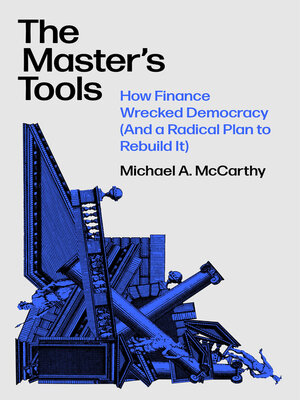The Master's Tools
ebook ∣ How Finance Wrecked Democracy (And a Radical Plan to Rebuild It)
By Michael McCarthy

Sign up to save your library
With an OverDrive account, you can save your favorite libraries for at-a-glance information about availability. Find out more about OverDrive accounts.
Find this title in Libby, the library reading app by OverDrive.



Search for a digital library with this title
Title found at these libraries:
| Library Name | Distance |
|---|---|
| Loading... |
Finance serves the rich and powerful. We need to democratize it.
Why is democracy so broken and how might it be fixed? In The Master's Tools, award-winning author Michael A. McCarthy argues the answer can be found in the flows of credit and investment bound up with finance capital.
Today, finance guides and constrains our politics, but there is no reason why this must be so. In this groundbreaking work, McCarthy develops a political and social theory of institutional transformation rooted in the interconnectedness of finance and democracy.
Inspired by ancient Athens, where small groups chosen by lottery were used to ensure democratic participation, he shows how democracy and working-class power can be strengthened by introducing new forms of financial governance, focusing on the inclusion of historically excluded groups.
His proposals for democratic financial institutions point the way to imbuing finance with a socio-environmental purpose and the funding of a just green transition, social housing, and other necessary public goods. And these financial institutions might be the first step toward a whole new kind of economy.
Why is democracy so broken and how might it be fixed? In The Master's Tools, award-winning author Michael A. McCarthy argues the answer can be found in the flows of credit and investment bound up with finance capital.
Today, finance guides and constrains our politics, but there is no reason why this must be so. In this groundbreaking work, McCarthy develops a political and social theory of institutional transformation rooted in the interconnectedness of finance and democracy.
Inspired by ancient Athens, where small groups chosen by lottery were used to ensure democratic participation, he shows how democracy and working-class power can be strengthened by introducing new forms of financial governance, focusing on the inclusion of historically excluded groups.
His proposals for democratic financial institutions point the way to imbuing finance with a socio-environmental purpose and the funding of a just green transition, social housing, and other necessary public goods. And these financial institutions might be the first step toward a whole new kind of economy.







